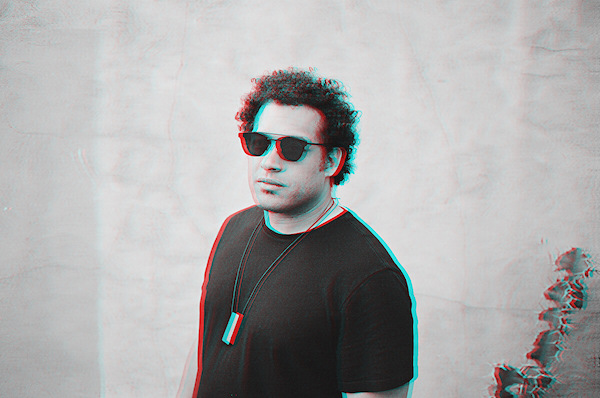Jan 13, 2026 2:09 PM
More Trump-Kennedy Center Cancellations
The fallout from the renaming of the John F. Kennedy Center for the Performing Arts to include President Donald…

Drummer and producer Makaya McCraven revamps Gil Scott-Heron on We’re New Again: A Reimagining by Makaya McCraven (XL).
(Photo: Leslie Kirchhoff)Chicago’s Makaya McCraven is best known as a drummer and producer, mixing and matching genres until they blend as one. While he admits that hip-hop has played a major role in his musical development, marrying it to a jazz aesthetic took some time, coalescing on 2018’s Universal Beings.
His latest album, We’re New Again: A Reimagining By Makaya McCraven (XL), is another kind of pastiche. And this time, the producer’s source material is Gil Scott-Heron’s I’m New Here, the vocalist and poet’s final studio effort from 2010. Oddly enough, though, it’s already been remixed once: Jamie XX worked over the project back in 2011, the year that the politically poignant Scott-Heron passed away.
While McCraven’s recent albums have centered on remixing his own live recordings, this was the first project where he’d reimagined another performer’s full-length.
“I didn’t choose the record. The record chose me,” McCraven said about the 10-year-old Scott-Heron album. “I was approached by Richard Russell, who produced the original record with Gil. He asked me to do a remix project of sorts. I was surprised and honored to be considered.”
With a bit of resequencing and the addition of new production around Scott-Heron’s ragged voice crooning harsh lyrics, McCraven managed to summon avant-garde sounds perfectly suited to the project.
I’m New Here—the source material a meeting of spoken word and gruff singing layered atop beat music—almost sounds like a remix project itself. But McCraven rebuilt the music, somehow managing to maintain the original’s essence. A prime example is “New York Is Killing Me,” which was startling enough in its original version. In McCraven’s take, added electronics build a city the singer wishes he could leave.
The producer was taken by “the age in [Scott-Heron’s] voice and [the] references to going back home and coming full circle with your whole life—the good, the bad and the ugly,” he said. “That struck me, as an artist trying to survive, bringing positivity to the world through work. Gil Scott-Heron represented being honest and provocative. That being his last statement, it was something powerful in itself.”
While McCraven acknowledges the impact of sample-based music on his own albums, he frequently looks further back for inspiration: “Les Paul and the use of a tape machine, and the Beatles overdubbing on four-tracks; I find that using recordings and repurposing sound is fascinating and can be done in a variety of ways.”
But to hear McCraven tell it, there was no real blueprint for We’re New Again.
“I used a variety of techniques. I don’t know if I’ve got a recipe, but I’ve got a recipe book,” he said. “The way I approach music in general is as a creative endeavor, something where I’m searching and learning and experimenting. I enjoy utilizing the studio as a tool to create music. The recording space is a separate sonic universe than the live space. Something that [guitarist] Jeff Parker told me one time: For him, a record isn’t just a document of what happened, but it’s also something entirely of itself. I really like that sentiment. When I produce music, that’s kind of where I’m at. When presented with something that’s wild, I try to utilize a variety of techniques, putting something of myself into it.”
For all of his investment in technology, McCraven avoids any contemporary sonic trappings that might make We’re New Again sound dated in a few years’ time.
“The purpose here is to make compelling art,” he said, “paying homage to the past and looking towards the future.”
With his reinterpretation of Scott-Heron’s final album, McCraven manages to do that, while also giving listeners a new twist on an album that was unpredictable to begin with. DB

Belá Fleck during an interview with Fredrika Whitfield on CNN.
Jan 13, 2026 2:09 PM
The fallout from the renaming of the John F. Kennedy Center for the Performing Arts to include President Donald…

Peplowski first came to prominence in legacy swing bands, including the final iteration of the Benny Goodman Orchestra, before beginning a solo career in the late 1980s.
Feb 3, 2026 12:10 AM
Ken Peplowski, a clarinetist and tenor saxophonist who straddled the worlds of traditional and modern jazz, died Feb. 2…

The success of Oregon’s first album, 1971’s Music Of Another Present Era, allowed Towner to establish a solo career.
Jan 19, 2026 5:02 PM
Ralph Towner, a guitarist and composer who blended multiple genres, including jazz — and throughout them all remained…

Rico’s Anti-Microbial Instrument Swab
Jan 19, 2026 2:48 PM
With this year’s NAMM Show right around the corner, we can look forward to plenty of new and innovative instruments…

Richie Beirach was particularly renowned for his approach to chromatic harmony, which he used to improvise reharmonizations of originals and standards.
Jan 27, 2026 11:19 AM
Richie Beirach, a pianist and composer who channeled a knowledge of modern classical music into his jazz practice,…